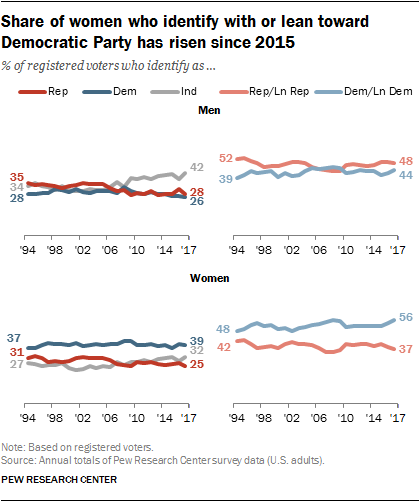By: Richard W. Sharp & Patrick W. Zimmerman
The only thing we have to fear is acquiescence.
Action must be the reaction to last week’s exhibition of raw contempt for the American people by the gerontocracy, and that action must be the vote. While the national trauma of the Kavanaugh nomination hearings played its final act last week, several reports noted how ramming through a perjourous, abusive, hot-tempered partisan has excited the Republican base. The decision by our government that Dr. Ford’s testimony was believable, but that it simply didn’t matter, deeply affected many people. It was not an “agree to disagree” moment, it was a personal affront and deeply painful.
A narrative has emerged that this double punch from the Kavanaugh confirmation fight was a strategic mistake by the Democratic party that could lead to a Republican victory in November, energizing the Republican base and deflating the left.
The reports are wrong.
Midterms depend on turnout and turnout depends on people having something to vote for. Democrats have provided this. It is easy to forget that the nomination battle was lost in 2016 when Republicans gained full control of the government. Democrats in Congress did not fight the nomination because they thought they could prevent Kavanaugh from gaining the court. They fought to show their voters what they are willing to take on if given the tools to do so.
On top of this, Democrats hold several structural advantages heading into November. Many leading indicators lean in their favor, from participation in the primaries to solid fundraising to the fact that more people vote for them (Hillary got the most votes, but I guess the rule is one person one vote is just an approximation?).
On November 6, America must put the GOP on notice by wresting at least one of the levers of political power from their grasp. The most likely outcome at the moment is that Democrats with the House and Republicans retain the Senate. This is far from certain (don’t mistake 3:1 odds on taking the House for a slam dunk). So what’s at stake? What are some of the political consequences? Let’s examine the likely scenarios.
Scenarios
Here are some educated guesses for what comes next after November. These are presented without mention of Robert Mueller. The very Special and very unpredictable Counsel is a wildcard. We don’t know what he’ll say or when he’ll say it, so speculation on any one possibility is too far fetched and the number of possibilities are too many to examine all. We’ll just stick to the immediate consequences.
Presented in order of descending likelihood:
The odds-on favorite: Democrats win the House, Republicans hold the Senate
Democrats gain power to start some investigations and power of the purse. A certain family’s tax practices and foreign ties become a constant topic. The Wall, further tax cuts, and further cuts to the AHA are probably off the table, as is funding for some of Trump’s pet projects (Space Force, anyone?). This will irk The Donald to no end. This will also probably exacerbate the existing tensions within the Republican Party between the Wall Street Wing (think: the Koch Brothers) and the Ideological Wing (think: Trumpists), though likely not create an outright split. Democrats can’t do anything directly about court picks, but they will have some leverage to negotiate (with the GOP establishment, at least).
The elephant in the room will be the impeachment question, though it will be purely a political calculation since there will be no hope of follow through in the Senate (think of it like the 70-ish times Republicans voted to repeal Obamacare). In any event, Trump will likely ramp up the fear-mongering (and it looks like he got a head start this morning) and the GOP will focus even more on Nancy Pelosi as a boogeywoman to try and scare moderates into turning out for them in 2020.
Doomsday: Republicans win the House and Senate
Trump gains his mandate and whether it’s real (most voters want to live in his America) or fake (the product of a rigged system – hey, it worked two years ago) doesn’t really matter; if you had issues with Kavanaugh, just wait until the gloves come off.
Trump’s chances to get reelected in 2020 skyrocket as a disillusioned Democratic base stays home and a chastised establishment keeps its head down. The Democratic Establishment reverts to being the centrist Capitalism with Kid Gloves party that most of its representatives would prefer (these leftist rabble-rousers rock the boat, and change is always risky for those already in power). In this case, a split off of the Democratic party is possible, though still unlikely given the inertia within American political culture. We might see the Kamala Harris / Elizabeth Warren / Barbara Lee / Bernie Sanders sector of the American Political spectrum forming a new Progressive Party or something like it.
Ruth Bader Ginsberg (85) and Steven Breyer (80), two liberal justices, aren’t exactly young, and a Trump reelection opens up the chance that he’ll get to appoint not 2, but 4 of the members of the Supreme Court.
Republicans have not pushed any sort of legislative agenda beyond tax cuts, and they’ve already done that. While there may be some destructive legislation (repeal Obamacare, continued diminishment of regulatory bodies like the EPA), don’t expect any constructive policy projects (beyond constructing walls of course).
Don’t count your chickens: Democrats win the House and Senate
The result is similar to our most likely scenario except that the Democrats would put the brakes on court and other “advise and consent” style appointments. In an extreme version of this scenario, the tensions between the various wings of the Republican Party boil over into an outright split, with some of the Wall Street wing realizing that their goals of free trade and a safe and stable environment for capitalist profit now sound a lot more like moderate Democrats than they do anyone within the 2018 GOP.
The possibility of a successful impeachment should still be very unlikely (though it would certainly be tried as, at least, a symbolic gesture, there’s no scenario in which Democrats get 2/3 of the votes in the Senate needed to follow through with it). Following last week’s exhibition of contempt for standard concepts of decency, even Trump’s own prediction that he could “stand in the middle of Fifth Avenue and shoot someone” and still not suffer political consequences seems plausible. Also, there’s the 2020 calculation: will the country support impeachment because at this point it would be clear that running against Trump is a pretty sweet ticket. Why repeal a powerless Trump and replace with a competent Pence when you could run against the fool in 2020? The answer of course is nuclear Armageddon (the real kind, not the nuclear option: Senate rules edition), however, this is politics, so we’re not going to bet on clear thinking.
Not even worth the time to game it out: Democrats win the Senate, Republicans win the House
This article is long enough already, isn’t it? Let’s just agree that this one isn’t in the house of cards, and even if it were, the basics are outlined above.
That was a pretty big helping of “what if,” but the bottom line is that there’s a stark difference between the first and second most likely outcomes. The stakes are high. It’s time to vote.
Remind me again, why should I vote?
Because Democrats will fight, and they have some significant structural advantages. The message from the last section was, “Because it’s going to suck if you don’t,” but that’s hardly inspirational. That kind of advertising is not going to move people to get to the polls when they’ve got lives to live. So let’s recall a few facts, which are widely known to have a liberal bias.1
Democrats showed in the Kavanaugh hearings that they’re ready to fight. Whether sincere conviction or political calculation, it doesn’t matter: it was a promise to use the tools granted them in an electoral victory.
Democrats have some structural advantages. The first is demographics: they are the only major alternative to a party that has openly campaigned against anyone who would look out of place in the picture below, revealing a willful disregard of demographic trends in the US.

Source: The White House
Republican politicians are betting that defending old white men from the angry mob of #MeToo Leftists is a winning strategy this fall….but until we see some evidence about likely voters that shows it’s what the populace actually thinks about the whole affair, we’re leaving this check-mark in the Democrat column.
And there’s ample evidence that women are not pleased with the direction of the current administration. From the Women’s March on Washington to the protests in front of the Supreme Court, the one constant in the Resistance against Donald Trump’s administration has been that it has been spearheaded by women. In related news, roughly 51% of the population views the Republican Party really unfavorably.

Source: Pew Research Center
Looking ahead to election day, Democrats are on the right side of a voter enthusiasm gap. Generic ballots give Democrats about an 8-point advantage and early polling since the Kavanaugh hearing doesn’t show any signs of defeatism. Voter participation in the primaries was off the charts this year. On National Voter Registration Day in 2014 there were 154,500 registrations. This year there were more than 800,000.
Republicans enjoy their advantages as well. The Senate map is a good one for Republicans this year. Democrats basically need to run the table of all the close races and then win a couple of the longer shots in order to flip the Senate, simply because of the seats that happen to be up this year (⅓ of the Senate is up for election every 2 years). The GOP has mastered the art of gerrymandering and voter suppression. In practical terms, this means that Democrats don’t just have to win the most votes, they have to win a lot more than half of them.2 Court packing of course has its advantages. For example, In any potential recount or tie-breaking scenario, a 5-4 Conservative advantage on the Supreme Court leaves a potential Democrat relying on the hope that John Roberts will decide in their favor. We don’t love those odds. Finally, it’s a midterm, and older white voters are much more reliable voters in off-year elections than younger non-white voters. As noted above, they are a key Republican demographic. Republicans are well situated if you stay home and the result is close, but many of these advantages will vanish if the significant enthusiasm gap is transformed into actual votes on November 6.
Conclusion
Congressional politicians are weak. They rarely shape public opinion the way a strong orator can from the bully pulpit. When the public puts them on notice, they jump, and their biennial review is just four weeks away. While America’s political left has a deep bench: most voters, most votes, demographics; the right has stacked the deck: gerrymandering, voter suppression, court packing. The short-term win-at-all costs politics of the GOP, can only survive in the face of long-term pressure from the left by permanent rigging of the political system.
When their grip on the levers of power starts to slip, the wall of obstruction will give way to a wave of dissent. Ready to make them sense the coming flood by taking back the House on November 6?
Notes:
1 Originally Rob C., however, Stephen C. lends a certain something to the source material.. ^
2 Just ask Hillary, or for something a little more current take a look at how far off center the popular vote vs. winning control heat map is over at the FiveThirtyEight.^

No Comments on "Lifetime appointments to the Supreme Court got you down? Focus on winning elections"